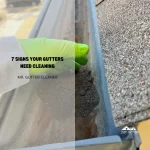Gutters play a pivotal role in home maintenance, serving as the first line of defense against various types of water damage. By channeling rainwater away from the foundation, gutters safeguard the structural integrity of a home, prevent soil erosion, and mitigate the risk of basement flooding.
The absence of proper guttering can lead to significant structural damage, adversely affect landscaping, and cause siding and exterior damage. Various gutter types, including seamless and sectional, and materials like aluminum, vinyl, steel, and copper, offer different benefits to homeowners.
Additionally, the integration of gutter guards can significantly enhance a gutter system’s effectiveness by preventing clogs. Maintaining gutters in optimal condition requires regular cleaning and inspection to identify and address any damage early on.
Homeowners should consider professional gutter maintenance services to ensure their gutter system remains effective year-round. Choosing the right gutters involves considering factors such as climate, home design, and budget, with professional installation being crucial to maximizing the gutter system’s performance and lifespan
This introduction sets the stage for an in-depth exploration of gutters’ importance, underscoring their role in preserving a home’s condition and the homeowner’s peace of mind.
What Are Gutters and How Do They Work?
Gutters are critical to home maintenance, channeling rainwater away from a home’s foundation to protect its structural integrity. This system, comprising troughs attached along the roof’s edge, efficiently directs water to downspouts. These downspouts then discharge the water at a safe distance from the house, minimizing the risk of water damage.
The Basic Structure of Gutters
The basic structure of gutters includes three main components: the gutter troughs, which capture rainwater from the roof; the downspouts, which funnel the water from the gutters to the ground; and the drain system, which directs the water away from the home’s foundation. This configuration is essential for the effective management of rainwater, ensuring it is diverted away from areas where it could cause harm.
How Gutters Protect Your Home
Gutters protect homes by preventing water from pooling around the foundation, where it could seep into basements or crawl spaces, causing damage and potentially leading to costly repairs. By directing water away from the house, gutters also prevent erosion around the foundation, safeguard siding and windows from water damage, and reduce the risk of mold and mildew growth. This protection is vital for maintaining the home’s overall health and ensuring its longevity.
Why Are Gutters Essential for Home Maintenance?
Gutters serve a fundamental role in preserving a home’s condition and preventing potential issues that can arise from improper water management. Their importance in home maintenance is multi-faceted, directly impacting the home’s longevity and safety.
Preventing Water Damage
Water damage is a leading concern for homeowners, capable of compromising structural integrity, promoting mold growth, and causing unsightly staining. Gutters avert these issues by efficiently channeling water away from the home, ensuring that roofs, walls, and foundations remain dry and intact.
Reducing Soil Erosion Around Foundations
Soil erosion around a home’s foundation can lead to uneven settling, which may cause cracks and structural damage over time. Gutters mitigate this risk by controlling the flow of rainwater, thereby preserving the soil’s stability and the foundation’s durability.
Preventing Basement Flooding
Basements are particularly vulnerable to flooding without proper rainwater diversion. Gutters play a critical role in preventing water from accumulating around the basement area, thus protecting interior spaces from water intrusion and the associated damages and mold risks.
What Happens Without Proper Guttering?
Lacking adequate guttering can lead to a myriad of issues for a home, highlighting the critical role gutters play in home maintenance and protection.
Risks of Structural Damage
Without gutters, water accumulates around the foundation, leading to hydrostatic pressure that can crack foundation walls. Over time, this can result in significant structural damage, undermining the home’s stability and safety.
Landscaping and Garden Impacts
Excessive water flow can erode soil, destroy landscaping, and wash away mulch or plants near a home’s perimeter. Gutters help direct water flow to prevent these issues, maintaining the aesthetic and health of outdoor spaces.
Siding and Exterior Damage
Water splashing against the siding can cause staining, wood rot, and paint damage. Continuous exposure to water can also penetrate exterior walls, causing interior damage. Proper guttering prevents such water exposure, protecting the home’s exterior and interior from moisture-related damage.
Types of Gutters and Their Benefits
The selection of gutters involves various types, each with distinct advantages, catering to different homeowner needs and preferences for effective water management.
Seamless vs. Sectional Gutters
Seamless gutters are custom-fitted to a home’s dimensions, minimizing leaks since they have fewer joints. Sectional gutters, on the other hand, come in pre-cut sections that are joined together during installation. While seamless gutters offer a sleek appearance and less maintenance, sectional gutters provide ease of installation and cost-effectiveness.
Material Choices: Aluminum, Vinyl, Steel, and Copper
- Aluminum gutters are lightweight, rust-resistant, and available in various colors, making them a popular choice for their durability and aesthetic flexibility.
- Vinyl gutters offer ease of installation and are immune to rust and corrosion, ideal for DIY enthusiasts due to their lightweight and snap-together design.
- Steel gutters are exceptionally strong, capable of withstanding heavy rain and snow, making them suitable for harsh weather conditions.
- Copper gutters excel in longevity and develop a unique patina over time, offering a distinctive look along with robust performance.
Gutter Guards and Their Importance
Gutter guards play a crucial role in maintaining gutter functionality by preventing leaves, debris, and nests from blocking the water flow. This addition can significantly reduce maintenance needs and extend the life of gutter systems, ensuring that water is efficiently diverted away from the home.
Maintenance Tips for Long-Lasting Gutters
Regular maintenance is key to ensuring gutters perform effectively over their lifespan, protecting the home from water-related issues.
Regular Cleaning and Inspection
Gutters should be cleaned at least twice a year, in the spring and fall, to remove leaves, twigs, and debris that can clog the system. During cleaning, inspecting for any signs of damage, such as cracks or sagging, is crucial to address minor issues before they escalate.
Identifying and Addressing Gutter Damage
Look for signs of wear, such as rust, holes, or separations between sections and the house. Early detection and repair of these issues can prevent more significant problems, including water damage to the foundation or exterior walls.
Professional Gutter Maintenance Services
While some homeowners may opt for DIY maintenance, professional gutter cleaning and repair services offer expertise and efficiency, ensuring gutters are in optimal condition. These services can provide thorough inspections, perform necessary repairs, and advise on potential upgrades to enhance gutter performance.
How to Choose the Right Gutters for Your Home
Selecting the right gutters involves considering various factors to ensure they meet the specific needs of your home and climate, offering effective protection against water damage.
Factors to Consider: Climate, Home Design, and Budget
- Climate: The local weather patterns, such as heavy rainfalls or snow, dictate the gutter size and material that would best suit a home. For instance, areas with heavier precipitation may require wider gutters or those with greater durability like steel.
- Home Design: The roof’s slope and architectural style influence gutter type and placement. Custom solutions might be necessary for complex roof designs to ensure efficient water management.
- Budget: Gutters come in a range of prices, with materials like vinyl being more budget-friendly, while copper gutters represent a higher upfront cost but offer longevity and aesthetic appeal.
The Role of Professional Installation
Professional installation is vital for ensuring gutters are correctly fitted and function as intended. Experts can assess a home’s specific needs, recommend the appropriate gutter system, and install it with precision. This not only guarantees the gutters’ effectiveness but also their durability, reducing the need for frequent repairs or replacements.
FAQs About Gutters
Addressing common questions about gutters can help homeowners make informed decisions regarding their gutter systems, ensuring they function effectively to protect the home.
How Often Should Gutters Be Replaced?
Gutter lifespan varies by material and maintenance. Aluminum and galvanized steel gutters typically last 20 to 30 years, while copper gutters can last over 50 years with proper care. Regular inspections can identify when replacement is necessary, often indicated by pervasive rust, numerous repairs, or systemic failures.
Can I Install Gutters Myself?
DIY gutter installation is possible, especially for vinyl gutter systems designed for easy assembly. However, for seamless gutters or materials requiring special handling, like copper, professional installation ensures optimal performance and safety. Consider your skill level, the complexity of your roofline, and the specific gutter material before deciding to install gutters yourself.
How Do I Know If My Gutters Aren’t Working Properly?
Signs of malfunctioning gutters include visible sagging, water spilling over the edges during rain, water stains on siding or the foundation, and areas of eroded landscaping directly below gutters. Regular inspections, especially during rainfall, can help detect issues early, allowing for timely repairs or adjustments.


